高中英语语法:动词和动词短语 课件(共43张PPT)
文档属性
| 名称 | 高中英语语法:动词和动词短语 课件(共43张PPT) |  | |
| 格式 | zip | ||
| 文件大小 | 517.0KB | ||
| 资源类型 | 教案 | ||
| 版本资源 | 通用版 | ||
| 科目 | 英语 | ||
| 更新时间 | 2020-08-17 20:45:20 | ||
图片预览

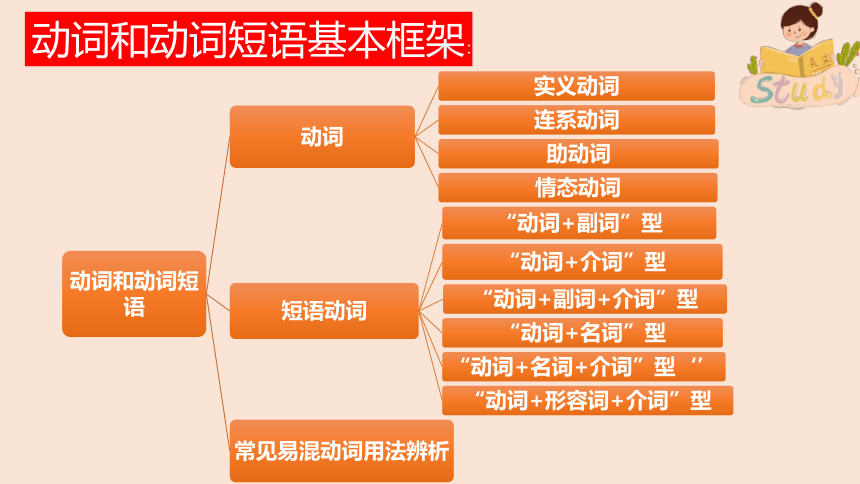

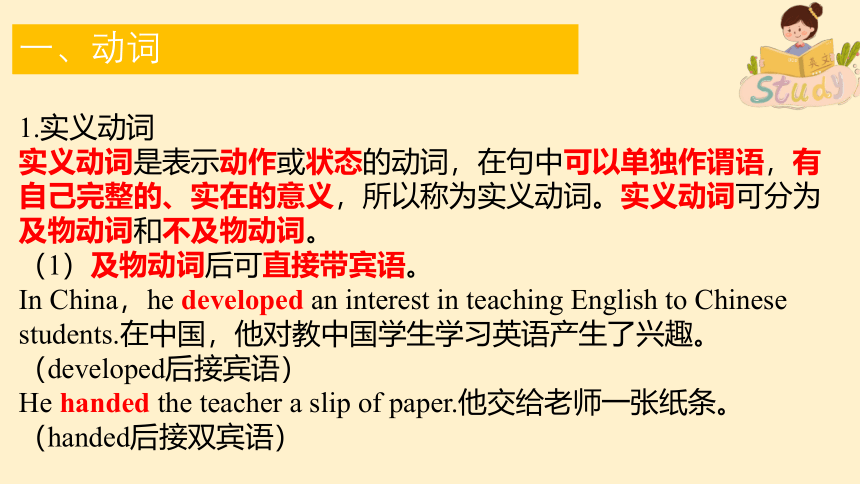
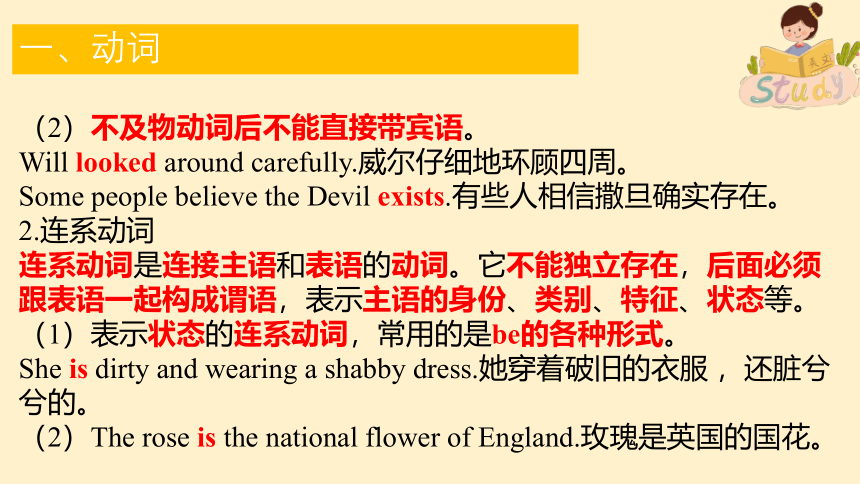
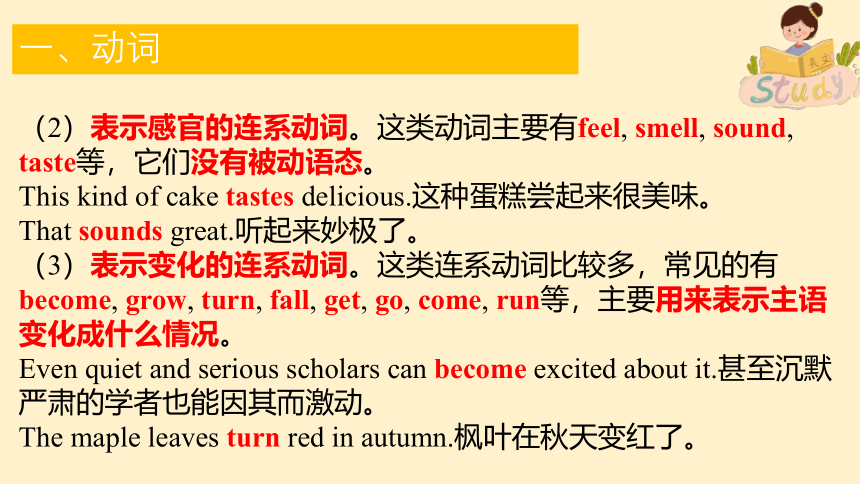
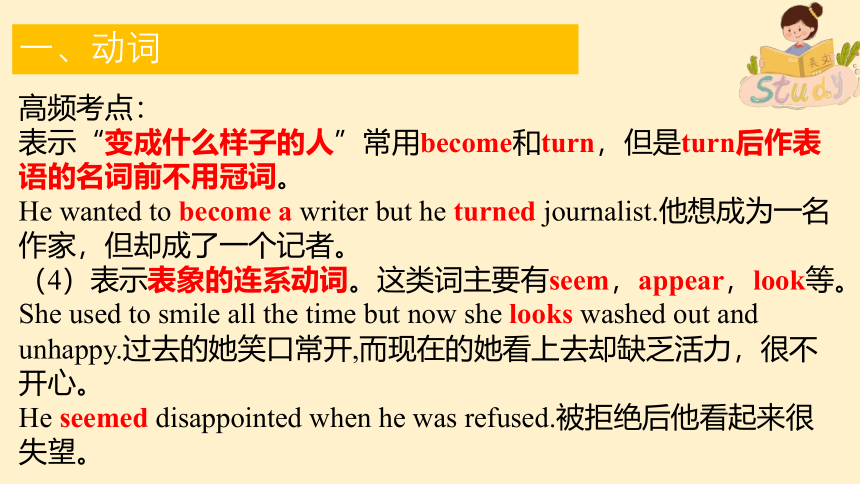
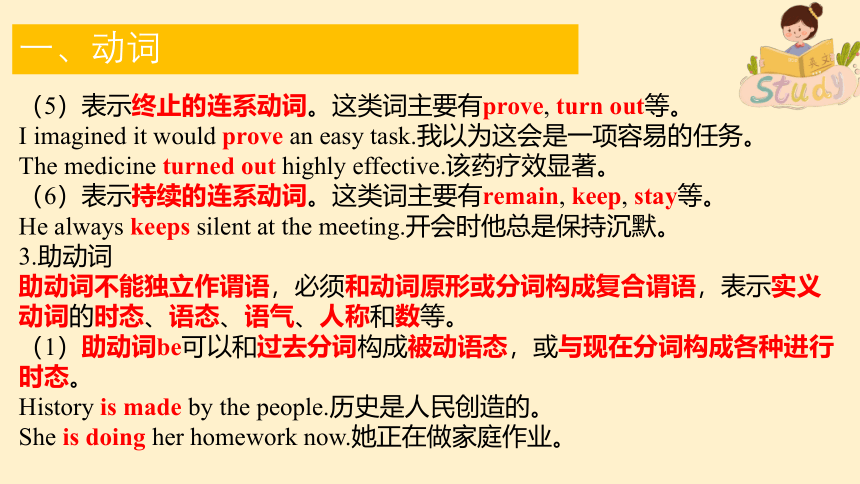
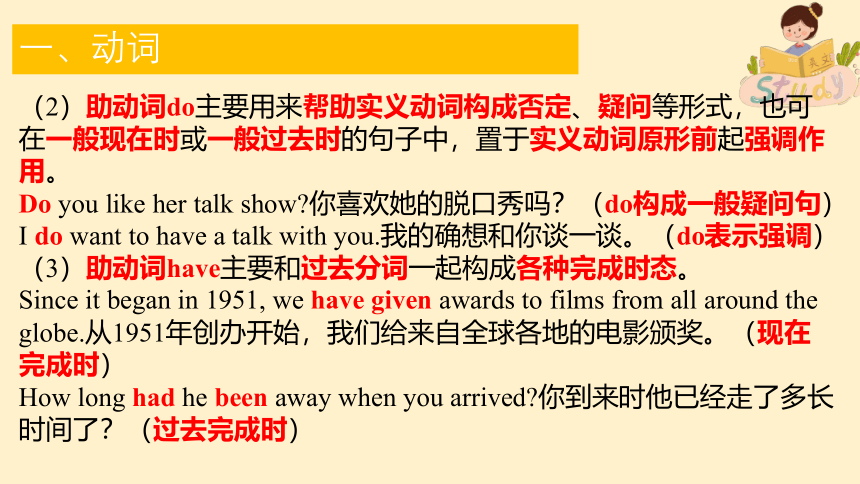
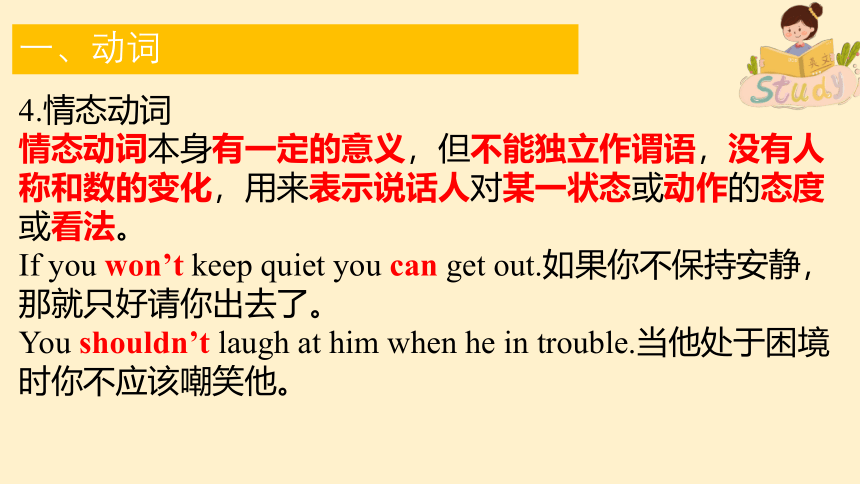
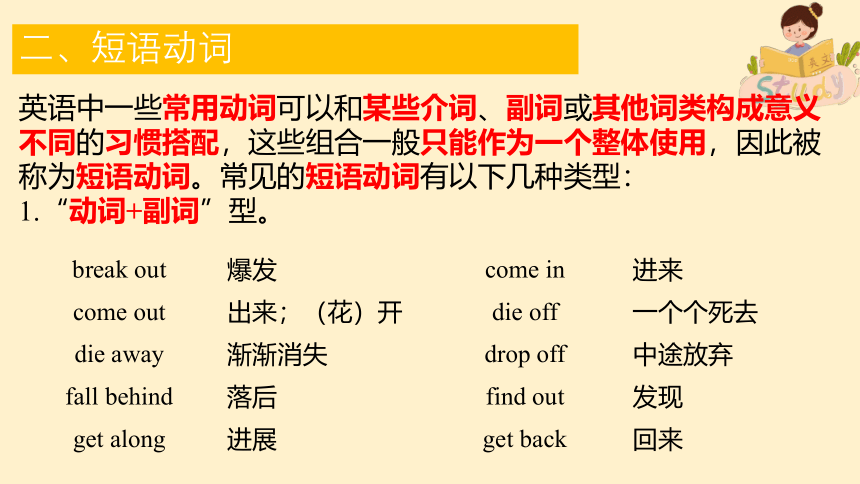
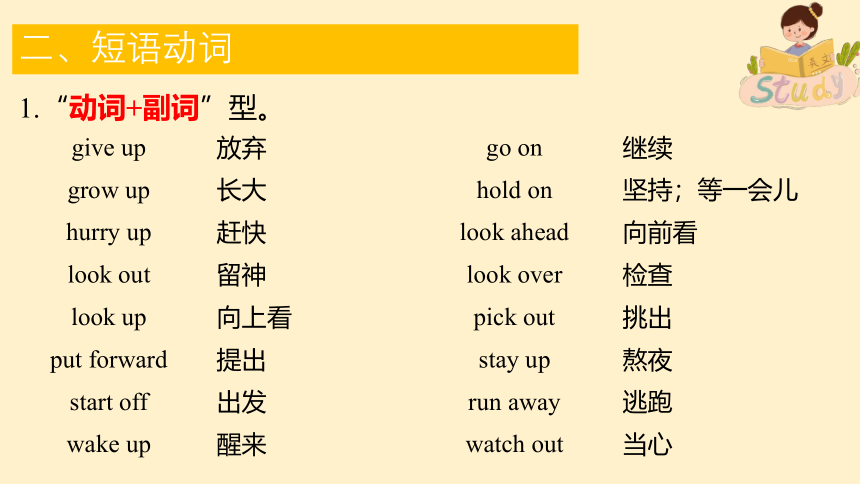
文档简介
(共43张PPT)
英
英
语
语
堂
法
课
语
课
高
堂
中
动词和动词短语
动词和动词短语基本框架:
动词和动词短语综述
动词是用来描述主语的动作、行为或状态的词,在句中作谓语,是句子中不可缺少的部分。
一、动词
1.实义动词
实义动词是表示动作或状态的动词,在句中可以单独作谓语,有自己完整的、实在的意义,所以称为实义动词。实义动词可分为及物动词和不及物动词。
(1)及物动词后可直接带宾语。
In
China,he
developed
an
interest
in
teaching
English
to
Chinese
students.在中国,他对教中国学生学习英语产生了兴趣。(developed后接宾语)
He
handed
the
teacher
a
slip
of
paper.他交给老师一张纸条。(handed后接双宾语)
一、动词
(2)不及物动词后不能直接带宾语。
Will
looked
around
carefully.威尔仔细地环顾四周。
Some
people
believe
the
Devil
exists.有些人相信撒旦确实存在。
2.连系动词
连系动词是连接主语和表语的动词。它不能独立存在,后面必须跟表语一起构成谓语,表示主语的身份、类别、特征、状态等。
(1)表示状态的连系动词,常用的是be的各种形式。
She
is
dirty
and
wearing
a
shabby
dress.她穿着破旧的衣服
,还脏兮兮的。
(2)The
rose
is
the
national
flower
of
England.玫瑰是英国的国花。
一、动词
(2)表示感官的连系动词。这类动词主要有feel,
smell,
sound,
taste等,它们没有被动语态。
This
kind
of
cake
tastes
delicious.这种蛋糕尝起来很美味。
That
sounds
great.听起来妙极了。
(3)表示变化的连系动词。这类连系动词比较多,常见的有become,
grow,
turn,
fall,
get,
go,
come,
run等,主要用来表示主语变化成什么情况。
Even
quiet
and
serious
scholars
can
become
excited
about
it.甚至沉默严肃的学者也能因其而激动。
The
maple
leaves
turn
red
in
autumn.枫叶在秋天变红了。
一、动词
高频考点:
表示“变成什么样子的人”常用become和turn,但是turn后作表语的名词前不用冠词。
He
wanted
to
become
a
writer
but
he
turned
journalist.他想成为一名作家,但却成了一个记者。
(4)表示表象的连系动词。这类词主要有seem,appear,look等。
She
used
to
smile
all
the
time
but
now
she
looks
washed
out
and
unhappy.过去的她笑口常开,而现在的她看上去却缺乏活力,很不开心。
He
seemed
disappointed
when
he
was
refused.被拒绝后他看起来很失望。
一、动词
(5)表示终止的连系动词。这类词主要有prove,
turn
out等。
I
imagined
it
would
prove
an
easy
task.我以为这会是一项容易的任务。
The
medicine
turned
out
highly
effective.该药疗效显著。
(6)表示持续的连系动词。这类词主要有remain,
keep,
stay等。
He
always
keeps
silent
at
the
meeting.开会时他总是保持沉默。
3.助动词
助动词不能独立作谓语,必须和动词原形或分词构成复合谓语,表示实义动词的时态、语态、语气、人称和数等。
(1)助动词be可以和过去分词构成被动语态,或与现在分词构成各种进行时态。
History
is
made
by
the
people.历史是人民创造的。
She
is
doing
her
homework
now.她正在做家庭作业。
一、动词
(2)助动词do主要用来帮助实义动词构成否定、疑问等形式,也可在一般现在时或一般过去时的句子中,置于实义动词原形前起强调作用。
Do
you
like
her
talk
show?你喜欢她的脱口秀吗?(do构成一般疑问句)
I
do
want
to
have
a
talk
with
you.我的确想和你谈一谈。(do表示强调)
(3)助动词have主要和过去分词一起构成各种完成时态。
Since
it
began
in
1951,
we
have
given
awards
to
films
from
all
around
the
globe.从1951年创办开始,我们给来自全球各地的电影颁奖。(现在完成时)
How
long
had
he
been
away
when
you
arrived?你到来时他已经走了多长时间了?(过去完成时)
一、动词
4.情态动词
情态动词本身有一定的意义,但不能独立作谓语,没有人称和数的变化,用来表示说话人对某一状态或动作的态度或看法。
If
you
won’t
keep
quiet
you
can
get
out.如果你不保持安静,那就只好请你出去了。
You
shouldn’t
laugh
at
him
when
he
in
trouble.当他处于困境时你不应该嘲笑他。
二、短语动词
英语中一些常用动词可以和某些介词、副词或其他词类构成意义不同的习惯搭配,这些组合一般只能作为一个整体使用,因此被称为短语动词。常见的短语动词有以下几种类型:
1.“动词+副词”型。
break
out
爆发
come
in
进来
come
out
出来;(花)开
die
off
一个个死去
die
away
渐渐消失
drop
off
中途放弃
fall
behind
落后
find
out
发现
get
along
进展
get
back
回来
二、短语动词
1.“动词+副词”型。
give
up
放弃
go
on
继续
grow
up
长大
hold
on
坚持;等一会儿
hurry
up
赶快
look
ahead
向前看
look
out
留神
look
over
检查
look
up
向上看
pick
out
挑出
put
forward
提出
stay
up
熬夜
start
off
出发
run
away
逃跑
wake
up
醒来
watch
out
当心
二、短语动词
1.“动词+副词”型。
The
Second
World
War
broke
out
in
September
1939.第二次世界大战爆发于1939年9月。
They
had
to
give
up
the
castle
to
the
enemy.他们只得把城堡拱手让给了敌人。
2.“动词+介词”型。
add
to
增加
account
for
解释,说明
adjust
to
调整
agree
with
同意……
ask
for
请求
break
into
破门而入
believe
in
相信
care
for
喜欢,关心
二、短语动词
2.“动词+介词”型。
care
about
在乎
care
from
解释,说明
come
across
调整
deal
with
同意……
feel
like
请求
fall
behind
破门而入
get
into
相信
go
about
喜欢,关心
laugh
at
嘲笑
listen
to
听
look
after
照顾
look
into
调查
look
for
寻找
rely
on
依靠
run
into
撞到;偶然遇上
stand
for
代表
二、短语动词
2.“动词+介词”型。
stick
to
坚持
wait
for
等候
wait
on
服侍
work
at
从事于,致力于
We
should
get
into
the
habit
of
keeping
good
hours.我们应该养成早睡早起的习惯。
No
one
like
to
be
laughed
at
in
public.没有人喜欢在公共场合被嘲笑。
注意:在构成被动语态时,整个短语动词一般不可拆开。
二、短语动词
3.“动词+副词+介词”型。
add
up
to
合计
break
away
from
脱离
be
fed
up
with
厌倦
catch
up
with
赶上
come
up
with
提出
date
back
to
追溯到
get
away
from
逃离
get
along
with
进展
get
down
to
开始认真做
get
through
to
与……通话
go
in
for
从事
go
on
with
继续
hold
on
to
保持,抓住
keep
away
from
远离
keep
on
with
继续做
keep
up
with
与……保持同步
二、短语动词
3.“动词+副词+介词”型。
live
up
to
不辜负
look
down
upon/on
蔑视
look
forward
to
期盼
look
out
for
警惕
look
up
to
尊敬
make
up
for
弥补
put
up
with
容忍
run
out
of
用光
settle
down
to
do
sth
开始做某事
Children
should
look
up
to
their
parents.孩子们应该尊敬父母。
Hard
work
can
make
up
for
a
lack
of
intelligence.勤能补拙。
二、短语动词
4.“动词+名词”型。
lose
courage
合计
lose
heart
脱离
lose
interest
厌倦
lose
patience
赶上
lose
weight
提出
lose
color
追溯到
make
sense
逃离
make
a
bed
进展
make
a
bet
开始认真做
make
a
bow
与……通话
make
faces
从事
make
fashion
继续
take
action
保持,抓住
take
advice
远离
take
aim
继续做
take
care
与……保持同步
二、短语动词
4.“动词+名词”型。
take
charge
看管
take
one’s
time
慢慢来
take
courage
鼓起勇气
take
effect
生效
take
exercise
锻炼
take
place
发生
take
power
取得政权
take
office
就职
Don’t
lose
heart.
Try
again.不要灰心,再试一次。
It
would
make
sense
to
leave
early.还是早点儿走好。
二、短语动词
5.“动词+名词+介词”型。
find
fault
with
挑……的毛病
get
rid
of
摆脱
get
rise
to
引起
lay
emphasis
on
强调
lose
sight
of
看不见
lay
foundation
for
为……打基础
make
a
fool
of
嘲弄
make
peace
with
讲和
make
contributions
to
对……作贡献
make
progress
in
在…方面取得进步
make
friends
with
与……交朋友
make
room
for
为…腾出空间
make
fun
of
取笑
make
sense
of
弄清楚
make
preparations
for
为…做准备
make
way
for
让路给
二、短语动词
5.“动词+名词+介词”型。
make
use
of
挑……的毛病
pay
attention
to
摆脱
put
an
end
to
引起
set
foot
in
强调
take
account
of
看不见
take
advantage
of
为……打基础
take
care
of
嘲弄
take
charge
of
讲和
take
hold
of
对……作贡献
take
command
of
在…方面取得进步
take
part
in
参加
take
delight
in
以……为乐
take
notice
of
注意到
take
pride
in
因……而自豪
二、短语动词
5.“动词+名词+介词”型。
we
should
pay
special
attention
to
beautifying
our
environment.我们应该特别注意美化我们的环境。
She
determined
never
to
set
foot
in
that
house
again.她决定再也不进入那间屋子了。
6.“动词+形容词+介词”型
be
angry
with
因……生气
be
busy
with
忙于
be
different
from
与……不同
be
famous
for
因……著名
be
friendly
with
对……友好
be
good/bad
for
对……有益/害
be
good
at
取得政权
be
harmful
to
对……有害
be
interested
in
对……感兴趣
二、短语动词
6.“动词+形容词+介词”型
Harbin
is
famous
for
its
ice
and
snow.哈尔滨以其冰雪而著称。
He
might
be
interested
in
the
problem
we
have
discussed.他也许对我们讨论过的那个问题感兴趣。
三、常见易混动词用法辨析
1.accept,
receive
accept表示主观上接受;receive表示客观上收到,但不一定接受。
I
have
received
your
invitation,
but
I
am
sorry
I
can’t
accept
it.我已收到你的请柬。但是,很抱歉,我不能接受。
2.announce,
declare
announce指首次公开或正式宣布人们关心的某件事,含有“预告”的含义,有“郑重其事”之意;declare强调“明确地,公开地”宣告某事,如战争、和平或意见等,有“断言,声称”之意。
“The
result
will
be
announced
in
a
few
days,”she
declared.她明确的说:“结果将在几天后宣布”。
三、常见易混动词用法辨析
3.allow,
promise,
permit
allow指允许做某事,侧重于听任、默许,有消极意味;promise指向对方承诺要做某事,动作由承诺人完成;permit指允许某人做某事,动作由对方完成。
Father
promised
me
to
buy
a
new
bike
but
he
didn’t
permit
me
to
do
it
myself.
Finally
after
I
asked
for
it
strongly,
he
just
only
allowed
me
to
do
so.父亲答应为我买一辆新车,但他不允许我自己去买,最后在我的强烈要求下,他只好同意了。
三、常见易混动词用法辨析
4.beat,
defeat,
win
beat和defeat的宾语是人,一个单位或集体;beat常用于游戏或比赛中;win的宾语只能是物,常与game,
match,
prize搭配。
Yesterday
I
beat
my
classmate
at
chess.
He
won
only
one
set,
while
I
won
two
sets.
That’s
to
say,
he
was
defeated.昨天我和同学下棋,我赢了他。他只赢了一盘,而我赢了两盘。也就是说,他被打败了。
三、常见易混动词用法辨析
5.divide,
separate
divide强调把整体划分成若干部分,其后接into,
among等;separate强调把连在一起或靠近的分割开来,也可指“离别”,其后接from。
First,
he
separated
the
good
apples
from
the
bad
ones,
and
second,
he
divided
a
good
one
into
two
parts.首先,他把好苹果和坏苹果分开。然后,他把一个好苹果切成两半。
三、常见易混动词用法辨析
6.hire,
rent
hire强调短期或临时性的“租用,雇佣”;rent强调长期的“出租”,宾语一般是房舍、土地等。
We
rented
an
office
building
at
$4,000
a
year
and
hired
an
advertising
company
to
help
us
sell
our
new
software.我们以年租金4000美元的价格租下了移动办公大楼,并且委托一家广告公司替我们宣传新软件。
三、常见易混动词用法辨析
7.match,
fit,
suit
match指品质、设计等方面的匹配,意为“与……相配”;fit强调大小合身;suit表示“适合”,强调颜色、样式适合某人。
The
dress
fits
you
well,
its
color
also
suits
you,
and
the
color
matches
the
dress.你穿这件衣服很合身,颜色也适合,而且颜色与衣服很匹配。
拓展:suit还可指某种安排和情况是否匹配。
Tuesday
would
suit
me
very
well
for
a
meeting.星期二开会对我来说很合适。
三、常见易混动词用法辨析
8.raise,
rise
raise表示“提起,升起”,是及物动词,常用搭配有raise
one’s
voice/hand/head(提高嗓门/举起手/抬起头)等;rise表示“提高,升起”,是不及物动词,常表示water,
steam等的升起,和wind,sun等的上升。
I
raised
my
head
to
see
that
the
river
was
now
rising
quickly.我抬起头看到了河水正在迅速上涨。
三、常见易混动词用法辨析
9.know,recognize
know表示“与……相识”,是持续性动词;recognize表示“认出”,是瞬间的动作,只有在原来认识的基础上,才可以认出。
I
have
known
him
for
ten
years.
But
I
didn’t
recognize
him
just
now
because
he
has
changed
so
much.我认识他已经10年了,但是他的变化如此之大,我刚才没有认出来。
动词和动词短语巩固练习
选择填空
1.The
teacher
had
intended
not
to
tell
the
students
but
his
remark
_________the
answer
to
the
question.
put
away
B.
put
out
C.
gave
away
D.
gave
out
2.
Joining
the
firm
as
a
clerk,
he
got
rapid
promotion,
and
______
as
a
manager.
ended
up
B.
dropped
out
C.
came
back
D.
started
off
3.In
much
of
the
animal
world,
night
is
the
time
______
for
sleep
–
pure
and
simple.
A.
set
aside
B.
set
down
C.
set
off
D.
set
up
C
A
A
动词和动词短语巩固练习
选择填空
4.How
elegant
and
attractive
our
teacher
is
today!
—Yes.
The
red
dress
____
her
hidden
beauty.
brings
out
B.
takes
out
C.
lets
out
D.
gives
out2.
Joining
5.I
want
to
learn
about
your
holidays.
Could
you
tell
me
how
you
usually_______
Thanksgiving
Day
in
your
country
?
Congratulate
B.
remind
C.
remember
D.
observe
6.In
the
beauty
competition,
women
are
asked_______
some
of
the
exercises
________
the
music.
A.
performing
to;
to
B.
performing;
with
C.
to
perform;
to
D.
to
perform;
by
A
D
C
动词和动词短语巩固练习
选择填空
7.
They
eat
only
plant
foods,
and
take
care
to
________
animal
products
from
other
areas
of
their
lives.
contain
B.
maintain
C.
exclude
D.
Include
8.
Believe
it
or
not,
your
ship
isn’t
quite
sunk,
as
there
are
some
ways
to
________
a
new
career
even
if
it’s
something
you’ve
never
done
before.
burst
into
B.
get
through
C.
break
into
D.
comb
through
9.You
are
not
________
to
unemployment
benefit
if
you
have
never
worked.
A.
accustomed
B.
resigned
C.
entitled
D.
submitted
C
C
C
动词和动词短语巩固练习
选择填空
10.The
house
prices
fell
sharply
at
the
end
of
last
year,
but
______
at
the
beginning
of
this
year.
repaired
B.
recovered
C.
replaced
D.
reduced
11.
We
have
a
high
regard
for
Mr.
Black
because
he
always
tries
to
________
his
principles.
live
up
to
B.
look
forward
to
C.
catch
up
with
D.
put
up
with
12.
—
It's
Mary's
own
fault
if
she
feels
________
at
the
party.
—
She
makes
no
effort
to
be
friendly
to
people.
A.
cut
out
B.
stood
out
C.
left
out
D.
made
out
B
A
C
动词和动词短语巩固练习
翻译词组
在乎
解释,说明
调整
同意……
请求
破门而入
相信
喜欢,关心
嘲笑
听
照顾
调查
寻找
依靠
撞到;偶然遇上
代表
动词和动词短语巩固练习
翻译词组
在乎
care
about
解释,说明
care
from
调整
come
across
同意……
deal
with
请求
feel
like
破门而入
fall
behind
相信
get
into
喜欢,关心
go
about
嘲笑
laugh
at
听
listen
to
照顾
look
after
调查
look
into
寻找
look
for
依靠
rely
on
撞到;偶然遇上
run
into
代表
stand
for
动词和动词短语巩固练习
翻译词组
look
up
pick
out
put
forward
stay
up
start
off
run
away
wake
up
watch
out
add
up
to
break
away
from
be
fed
up
with
catch
up
with
come
up
with
date
back
to
get
away
from
get
along
with
动词和动词短语巩固练习
翻译词组
look
up
向上看
pick
out
挑出
put
forward
提出
stay
up
熬夜
start
off
出发
run
away
逃跑
wake
up
醒来
watch
out
当心
add
up
to
合计
break
away
from
脱离
be
fed
up
with
厌倦
catch
up
with
赶上
come
up
with
提出
date
back
to
追溯到
get
away
from
逃离
get
along
with
进展
动词和动词短语巩固练习
翻译句子
1.
在中国,他对教中国学生学习英语产生了兴趣
2.
他交给老师一张纸条
3.
玫瑰是英国的国花。
4.
历史是人民创造的。
5.
从1951年创办开始,我们给来自全球各地的电影颁奖。
动词和动词短语巩固练习
翻译句子
1.
在中国,他对教中国学生学习英语产生了兴趣。
In
China,
he
developed
an
interest
in
teaching
English
to
Chinese
students.
2.
他交给老师一张纸条。
He
handed
the
teacher
a
slip
of
paper.
3.
玫瑰是英国的国花。
The
rose
is
the
national
flower
of
England.
4.
历史是人民创造的。
History
is
made
by
the
people.
5.
从1951年创办开始,我们给来自全球各地的电影颁奖。
Since
it
began
in
1951,
we
have
given
awards
to
films
from
all
around
the
globe.
动词和动词短语巩固练习
翻译句子
6.
勤能补拙。
7.
不要灰心,再试一次。
8.
他也许对我们讨论过的那个问题感兴趣。
9.
首先,他把好苹果和坏苹果分开。然后,他把一个好苹果切成两半。
动词和动词短语巩固练习
翻译句子
6.
勤能补拙。
Hard
work
can
make
up
for
a
lack
of
intelligence.
7.
不要灰心,再试一次。
Don’t
lose
heart.
Try
again.
8.
他也许对我们讨论过的那个问题感兴趣。
He
might
be
interested
in
the
problem
we
have
discussed.
9.
首先,他把好苹果和坏苹果分开。然后,他把一个好苹果切成两半。
First,
he
separated
the
good
apples
from
the
bad
ones,
and
second,
he
divided
a
good
one
into
two
parts.
英
英
语
语
堂
法
课
语
课
高
堂
中
动词和动词短语
动词和动词短语基本框架:
动词和动词短语综述
动词是用来描述主语的动作、行为或状态的词,在句中作谓语,是句子中不可缺少的部分。
一、动词
1.实义动词
实义动词是表示动作或状态的动词,在句中可以单独作谓语,有自己完整的、实在的意义,所以称为实义动词。实义动词可分为及物动词和不及物动词。
(1)及物动词后可直接带宾语。
In
China,he
developed
an
interest
in
teaching
English
to
Chinese
students.在中国,他对教中国学生学习英语产生了兴趣。(developed后接宾语)
He
handed
the
teacher
a
slip
of
paper.他交给老师一张纸条。(handed后接双宾语)
一、动词
(2)不及物动词后不能直接带宾语。
Will
looked
around
carefully.威尔仔细地环顾四周。
Some
people
believe
the
Devil
exists.有些人相信撒旦确实存在。
2.连系动词
连系动词是连接主语和表语的动词。它不能独立存在,后面必须跟表语一起构成谓语,表示主语的身份、类别、特征、状态等。
(1)表示状态的连系动词,常用的是be的各种形式。
She
is
dirty
and
wearing
a
shabby
dress.她穿着破旧的衣服
,还脏兮兮的。
(2)The
rose
is
the
national
flower
of
England.玫瑰是英国的国花。
一、动词
(2)表示感官的连系动词。这类动词主要有feel,
smell,
sound,
taste等,它们没有被动语态。
This
kind
of
cake
tastes
delicious.这种蛋糕尝起来很美味。
That
sounds
great.听起来妙极了。
(3)表示变化的连系动词。这类连系动词比较多,常见的有become,
grow,
turn,
fall,
get,
go,
come,
run等,主要用来表示主语变化成什么情况。
Even
quiet
and
serious
scholars
can
become
excited
about
it.甚至沉默严肃的学者也能因其而激动。
The
maple
leaves
turn
red
in
autumn.枫叶在秋天变红了。
一、动词
高频考点:
表示“变成什么样子的人”常用become和turn,但是turn后作表语的名词前不用冠词。
He
wanted
to
become
a
writer
but
he
turned
journalist.他想成为一名作家,但却成了一个记者。
(4)表示表象的连系动词。这类词主要有seem,appear,look等。
She
used
to
smile
all
the
time
but
now
she
looks
washed
out
and
unhappy.过去的她笑口常开,而现在的她看上去却缺乏活力,很不开心。
He
seemed
disappointed
when
he
was
refused.被拒绝后他看起来很失望。
一、动词
(5)表示终止的连系动词。这类词主要有prove,
turn
out等。
I
imagined
it
would
prove
an
easy
task.我以为这会是一项容易的任务。
The
medicine
turned
out
highly
effective.该药疗效显著。
(6)表示持续的连系动词。这类词主要有remain,
keep,
stay等。
He
always
keeps
silent
at
the
meeting.开会时他总是保持沉默。
3.助动词
助动词不能独立作谓语,必须和动词原形或分词构成复合谓语,表示实义动词的时态、语态、语气、人称和数等。
(1)助动词be可以和过去分词构成被动语态,或与现在分词构成各种进行时态。
History
is
made
by
the
people.历史是人民创造的。
She
is
doing
her
homework
now.她正在做家庭作业。
一、动词
(2)助动词do主要用来帮助实义动词构成否定、疑问等形式,也可在一般现在时或一般过去时的句子中,置于实义动词原形前起强调作用。
Do
you
like
her
talk
show?你喜欢她的脱口秀吗?(do构成一般疑问句)
I
do
want
to
have
a
talk
with
you.我的确想和你谈一谈。(do表示强调)
(3)助动词have主要和过去分词一起构成各种完成时态。
Since
it
began
in
1951,
we
have
given
awards
to
films
from
all
around
the
globe.从1951年创办开始,我们给来自全球各地的电影颁奖。(现在完成时)
How
long
had
he
been
away
when
you
arrived?你到来时他已经走了多长时间了?(过去完成时)
一、动词
4.情态动词
情态动词本身有一定的意义,但不能独立作谓语,没有人称和数的变化,用来表示说话人对某一状态或动作的态度或看法。
If
you
won’t
keep
quiet
you
can
get
out.如果你不保持安静,那就只好请你出去了。
You
shouldn’t
laugh
at
him
when
he
in
trouble.当他处于困境时你不应该嘲笑他。
二、短语动词
英语中一些常用动词可以和某些介词、副词或其他词类构成意义不同的习惯搭配,这些组合一般只能作为一个整体使用,因此被称为短语动词。常见的短语动词有以下几种类型:
1.“动词+副词”型。
break
out
爆发
come
in
进来
come
out
出来;(花)开
die
off
一个个死去
die
away
渐渐消失
drop
off
中途放弃
fall
behind
落后
find
out
发现
get
along
进展
get
back
回来
二、短语动词
1.“动词+副词”型。
give
up
放弃
go
on
继续
grow
up
长大
hold
on
坚持;等一会儿
hurry
up
赶快
look
ahead
向前看
look
out
留神
look
over
检查
look
up
向上看
pick
out
挑出
put
forward
提出
stay
up
熬夜
start
off
出发
run
away
逃跑
wake
up
醒来
watch
out
当心
二、短语动词
1.“动词+副词”型。
The
Second
World
War
broke
out
in
September
1939.第二次世界大战爆发于1939年9月。
They
had
to
give
up
the
castle
to
the
enemy.他们只得把城堡拱手让给了敌人。
2.“动词+介词”型。
add
to
增加
account
for
解释,说明
adjust
to
调整
agree
with
同意……
ask
for
请求
break
into
破门而入
believe
in
相信
care
for
喜欢,关心
二、短语动词
2.“动词+介词”型。
care
about
在乎
care
from
解释,说明
come
across
调整
deal
with
同意……
feel
like
请求
fall
behind
破门而入
get
into
相信
go
about
喜欢,关心
laugh
at
嘲笑
listen
to
听
look
after
照顾
look
into
调查
look
for
寻找
rely
on
依靠
run
into
撞到;偶然遇上
stand
for
代表
二、短语动词
2.“动词+介词”型。
stick
to
坚持
wait
for
等候
wait
on
服侍
work
at
从事于,致力于
We
should
get
into
the
habit
of
keeping
good
hours.我们应该养成早睡早起的习惯。
No
one
like
to
be
laughed
at
in
public.没有人喜欢在公共场合被嘲笑。
注意:在构成被动语态时,整个短语动词一般不可拆开。
二、短语动词
3.“动词+副词+介词”型。
add
up
to
合计
break
away
from
脱离
be
fed
up
with
厌倦
catch
up
with
赶上
come
up
with
提出
date
back
to
追溯到
get
away
from
逃离
get
along
with
进展
get
down
to
开始认真做
get
through
to
与……通话
go
in
for
从事
go
on
with
继续
hold
on
to
保持,抓住
keep
away
from
远离
keep
on
with
继续做
keep
up
with
与……保持同步
二、短语动词
3.“动词+副词+介词”型。
live
up
to
不辜负
look
down
upon/on
蔑视
look
forward
to
期盼
look
out
for
警惕
look
up
to
尊敬
make
up
for
弥补
put
up
with
容忍
run
out
of
用光
settle
down
to
do
sth
开始做某事
Children
should
look
up
to
their
parents.孩子们应该尊敬父母。
Hard
work
can
make
up
for
a
lack
of
intelligence.勤能补拙。
二、短语动词
4.“动词+名词”型。
lose
courage
合计
lose
heart
脱离
lose
interest
厌倦
lose
patience
赶上
lose
weight
提出
lose
color
追溯到
make
sense
逃离
make
a
bed
进展
make
a
bet
开始认真做
make
a
bow
与……通话
make
faces
从事
make
fashion
继续
take
action
保持,抓住
take
advice
远离
take
aim
继续做
take
care
与……保持同步
二、短语动词
4.“动词+名词”型。
take
charge
看管
take
one’s
time
慢慢来
take
courage
鼓起勇气
take
effect
生效
take
exercise
锻炼
take
place
发生
take
power
取得政权
take
office
就职
Don’t
lose
heart.
Try
again.不要灰心,再试一次。
It
would
make
sense
to
leave
early.还是早点儿走好。
二、短语动词
5.“动词+名词+介词”型。
find
fault
with
挑……的毛病
get
rid
of
摆脱
get
rise
to
引起
lay
emphasis
on
强调
lose
sight
of
看不见
lay
foundation
for
为……打基础
make
a
fool
of
嘲弄
make
peace
with
讲和
make
contributions
to
对……作贡献
make
progress
in
在…方面取得进步
make
friends
with
与……交朋友
make
room
for
为…腾出空间
make
fun
of
取笑
make
sense
of
弄清楚
make
preparations
for
为…做准备
make
way
for
让路给
二、短语动词
5.“动词+名词+介词”型。
make
use
of
挑……的毛病
pay
attention
to
摆脱
put
an
end
to
引起
set
foot
in
强调
take
account
of
看不见
take
advantage
of
为……打基础
take
care
of
嘲弄
take
charge
of
讲和
take
hold
of
对……作贡献
take
command
of
在…方面取得进步
take
part
in
参加
take
delight
in
以……为乐
take
notice
of
注意到
take
pride
in
因……而自豪
二、短语动词
5.“动词+名词+介词”型。
we
should
pay
special
attention
to
beautifying
our
environment.我们应该特别注意美化我们的环境。
She
determined
never
to
set
foot
in
that
house
again.她决定再也不进入那间屋子了。
6.“动词+形容词+介词”型
be
angry
with
因……生气
be
busy
with
忙于
be
different
from
与……不同
be
famous
for
因……著名
be
friendly
with
对……友好
be
good/bad
for
对……有益/害
be
good
at
取得政权
be
harmful
to
对……有害
be
interested
in
对……感兴趣
二、短语动词
6.“动词+形容词+介词”型
Harbin
is
famous
for
its
ice
and
snow.哈尔滨以其冰雪而著称。
He
might
be
interested
in
the
problem
we
have
discussed.他也许对我们讨论过的那个问题感兴趣。
三、常见易混动词用法辨析
1.accept,
receive
accept表示主观上接受;receive表示客观上收到,但不一定接受。
I
have
received
your
invitation,
but
I
am
sorry
I
can’t
accept
it.我已收到你的请柬。但是,很抱歉,我不能接受。
2.announce,
declare
announce指首次公开或正式宣布人们关心的某件事,含有“预告”的含义,有“郑重其事”之意;declare强调“明确地,公开地”宣告某事,如战争、和平或意见等,有“断言,声称”之意。
“The
result
will
be
announced
in
a
few
days,”she
declared.她明确的说:“结果将在几天后宣布”。
三、常见易混动词用法辨析
3.allow,
promise,
permit
allow指允许做某事,侧重于听任、默许,有消极意味;promise指向对方承诺要做某事,动作由承诺人完成;permit指允许某人做某事,动作由对方完成。
Father
promised
me
to
buy
a
new
bike
but
he
didn’t
permit
me
to
do
it
myself.
Finally
after
I
asked
for
it
strongly,
he
just
only
allowed
me
to
do
so.父亲答应为我买一辆新车,但他不允许我自己去买,最后在我的强烈要求下,他只好同意了。
三、常见易混动词用法辨析
4.beat,
defeat,
win
beat和defeat的宾语是人,一个单位或集体;beat常用于游戏或比赛中;win的宾语只能是物,常与game,
match,
prize搭配。
Yesterday
I
beat
my
classmate
at
chess.
He
won
only
one
set,
while
I
won
two
sets.
That’s
to
say,
he
was
defeated.昨天我和同学下棋,我赢了他。他只赢了一盘,而我赢了两盘。也就是说,他被打败了。
三、常见易混动词用法辨析
5.divide,
separate
divide强调把整体划分成若干部分,其后接into,
among等;separate强调把连在一起或靠近的分割开来,也可指“离别”,其后接from。
First,
he
separated
the
good
apples
from
the
bad
ones,
and
second,
he
divided
a
good
one
into
two
parts.首先,他把好苹果和坏苹果分开。然后,他把一个好苹果切成两半。
三、常见易混动词用法辨析
6.hire,
rent
hire强调短期或临时性的“租用,雇佣”;rent强调长期的“出租”,宾语一般是房舍、土地等。
We
rented
an
office
building
at
$4,000
a
year
and
hired
an
advertising
company
to
help
us
sell
our
new
software.我们以年租金4000美元的价格租下了移动办公大楼,并且委托一家广告公司替我们宣传新软件。
三、常见易混动词用法辨析
7.match,
fit,
suit
match指品质、设计等方面的匹配,意为“与……相配”;fit强调大小合身;suit表示“适合”,强调颜色、样式适合某人。
The
dress
fits
you
well,
its
color
also
suits
you,
and
the
color
matches
the
dress.你穿这件衣服很合身,颜色也适合,而且颜色与衣服很匹配。
拓展:suit还可指某种安排和情况是否匹配。
Tuesday
would
suit
me
very
well
for
a
meeting.星期二开会对我来说很合适。
三、常见易混动词用法辨析
8.raise,
rise
raise表示“提起,升起”,是及物动词,常用搭配有raise
one’s
voice/hand/head(提高嗓门/举起手/抬起头)等;rise表示“提高,升起”,是不及物动词,常表示water,
steam等的升起,和wind,sun等的上升。
I
raised
my
head
to
see
that
the
river
was
now
rising
quickly.我抬起头看到了河水正在迅速上涨。
三、常见易混动词用法辨析
9.know,recognize
know表示“与……相识”,是持续性动词;recognize表示“认出”,是瞬间的动作,只有在原来认识的基础上,才可以认出。
I
have
known
him
for
ten
years.
But
I
didn’t
recognize
him
just
now
because
he
has
changed
so
much.我认识他已经10年了,但是他的变化如此之大,我刚才没有认出来。
动词和动词短语巩固练习
选择填空
1.The
teacher
had
intended
not
to
tell
the
students
but
his
remark
_________the
answer
to
the
question.
put
away
B.
put
out
C.
gave
away
D.
gave
out
2.
Joining
the
firm
as
a
clerk,
he
got
rapid
promotion,
and
______
as
a
manager.
ended
up
B.
dropped
out
C.
came
back
D.
started
off
3.In
much
of
the
animal
world,
night
is
the
time
______
for
sleep
–
pure
and
simple.
A.
set
aside
B.
set
down
C.
set
off
D.
set
up
C
A
A
动词和动词短语巩固练习
选择填空
4.How
elegant
and
attractive
our
teacher
is
today!
—Yes.
The
red
dress
____
her
hidden
beauty.
brings
out
B.
takes
out
C.
lets
out
D.
gives
out2.
Joining
5.I
want
to
learn
about
your
holidays.
Could
you
tell
me
how
you
usually_______
Thanksgiving
Day
in
your
country
?
Congratulate
B.
remind
C.
remember
D.
observe
6.In
the
beauty
competition,
women
are
asked_______
some
of
the
exercises
________
the
music.
A.
performing
to;
to
B.
performing;
with
C.
to
perform;
to
D.
to
perform;
by
A
D
C
动词和动词短语巩固练习
选择填空
7.
They
eat
only
plant
foods,
and
take
care
to
________
animal
products
from
other
areas
of
their
lives.
contain
B.
maintain
C.
exclude
D.
Include
8.
Believe
it
or
not,
your
ship
isn’t
quite
sunk,
as
there
are
some
ways
to
________
a
new
career
even
if
it’s
something
you’ve
never
done
before.
burst
into
B.
get
through
C.
break
into
D.
comb
through
9.You
are
not
________
to
unemployment
benefit
if
you
have
never
worked.
A.
accustomed
B.
resigned
C.
entitled
D.
submitted
C
C
C
动词和动词短语巩固练习
选择填空
10.The
house
prices
fell
sharply
at
the
end
of
last
year,
but
______
at
the
beginning
of
this
year.
repaired
B.
recovered
C.
replaced
D.
reduced
11.
We
have
a
high
regard
for
Mr.
Black
because
he
always
tries
to
________
his
principles.
live
up
to
B.
look
forward
to
C.
catch
up
with
D.
put
up
with
12.
—
It's
Mary's
own
fault
if
she
feels
________
at
the
party.
—
She
makes
no
effort
to
be
friendly
to
people.
A.
cut
out
B.
stood
out
C.
left
out
D.
made
out
B
A
C
动词和动词短语巩固练习
翻译词组
在乎
解释,说明
调整
同意……
请求
破门而入
相信
喜欢,关心
嘲笑
听
照顾
调查
寻找
依靠
撞到;偶然遇上
代表
动词和动词短语巩固练习
翻译词组
在乎
care
about
解释,说明
care
from
调整
come
across
同意……
deal
with
请求
feel
like
破门而入
fall
behind
相信
get
into
喜欢,关心
go
about
嘲笑
laugh
at
听
listen
to
照顾
look
after
调查
look
into
寻找
look
for
依靠
rely
on
撞到;偶然遇上
run
into
代表
stand
for
动词和动词短语巩固练习
翻译词组
look
up
pick
out
put
forward
stay
up
start
off
run
away
wake
up
watch
out
add
up
to
break
away
from
be
fed
up
with
catch
up
with
come
up
with
date
back
to
get
away
from
get
along
with
动词和动词短语巩固练习
翻译词组
look
up
向上看
pick
out
挑出
put
forward
提出
stay
up
熬夜
start
off
出发
run
away
逃跑
wake
up
醒来
watch
out
当心
add
up
to
合计
break
away
from
脱离
be
fed
up
with
厌倦
catch
up
with
赶上
come
up
with
提出
date
back
to
追溯到
get
away
from
逃离
get
along
with
进展
动词和动词短语巩固练习
翻译句子
1.
在中国,他对教中国学生学习英语产生了兴趣
2.
他交给老师一张纸条
3.
玫瑰是英国的国花。
4.
历史是人民创造的。
5.
从1951年创办开始,我们给来自全球各地的电影颁奖。
动词和动词短语巩固练习
翻译句子
1.
在中国,他对教中国学生学习英语产生了兴趣。
In
China,
he
developed
an
interest
in
teaching
English
to
Chinese
students.
2.
他交给老师一张纸条。
He
handed
the
teacher
a
slip
of
paper.
3.
玫瑰是英国的国花。
The
rose
is
the
national
flower
of
England.
4.
历史是人民创造的。
History
is
made
by
the
people.
5.
从1951年创办开始,我们给来自全球各地的电影颁奖。
Since
it
began
in
1951,
we
have
given
awards
to
films
from
all
around
the
globe.
动词和动词短语巩固练习
翻译句子
6.
勤能补拙。
7.
不要灰心,再试一次。
8.
他也许对我们讨论过的那个问题感兴趣。
9.
首先,他把好苹果和坏苹果分开。然后,他把一个好苹果切成两半。
动词和动词短语巩固练习
翻译句子
6.
勤能补拙。
Hard
work
can
make
up
for
a
lack
of
intelligence.
7.
不要灰心,再试一次。
Don’t
lose
heart.
Try
again.
8.
他也许对我们讨论过的那个问题感兴趣。
He
might
be
interested
in
the
problem
we
have
discussed.
9.
首先,他把好苹果和坏苹果分开。然后,他把一个好苹果切成两半。
First,
he
separated
the
good
apples
from
the
bad
ones,
and
second,
he
divided
a
good
one
into
two
parts.
